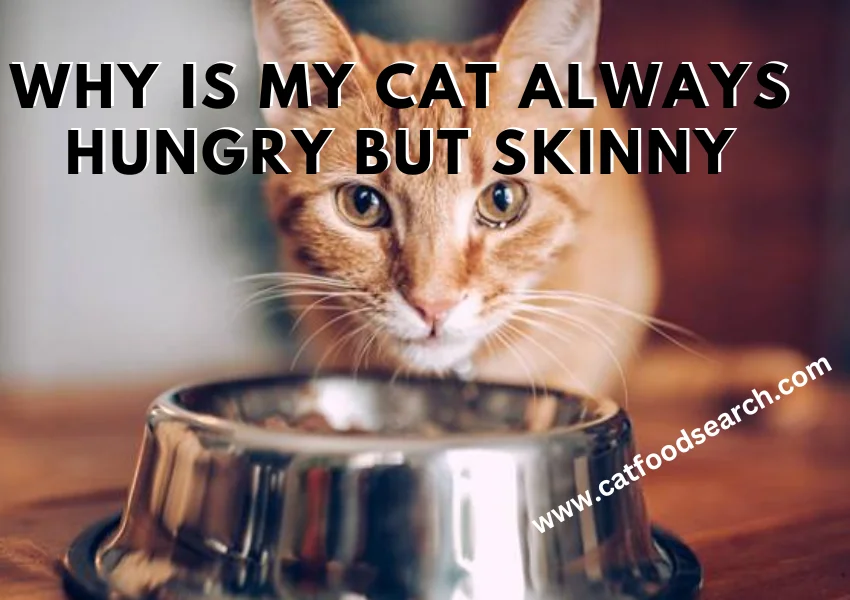If you’re a cat owner, you may have noticed that your feline friend is constantly begging for food, yet they remain thin and seemingly insatiable.
This peculiar behavior can leave you wondering, “Why is my cat always hungry but skinny?”
Protein is an important nutrient that helps your cat function normally. If your cat is always hungry but does not eat much, it might be a sign that it doesn’t have enough protein.
Learn more about what causes this problem and how you can help your pet!
In this article, I will explore the various factors that contribute to this phenomenon, including medical conditions, dietary habits, and natural instincts.
By understanding the underlying reasons behind your cat’s behavior, you’ll be better equipped to provide them with the care they need.
Table of Contents
Why Is My Cat Always Hungry But Skinny? 7 Possible Reasons
Cats are known for their love of food, but when your cat is constantly ravenous and fails to gain weight, it may indicate an underlying issue.
Here are the best 7 potential reasons for your cat’s insatiable appetite and thin physique.

1. Protein Deficiency
Cats need to have a proper amount of protein in their diet, especially if they eat a lot of wet food or commercial foods.
Read on to learn more about why cats are so bony and when they should be concerned about their diet.
According to the FDA, the average adult cat needs 18% protein in its diet. That may sound like a lot, but most commercial cat foods contain 20-25% protein.
Not only does protein help provide energy for your cat, but it also helps maintain many other body functions.
2. Hyperthyroidism
Hyperthyroidism is a disease in which the thyroid gland produces excessive amounts of hormones that usually results in: Weight loss, Increased heart rate, Increased thirst, and hunger, Vomiting, and diarrhea.
Cats with hyperthyroidism have an increased metabolic rate, which increases their appetite. They also tend to lose weight even if they eat more than usual.
Hyperthyroidism often occurs due to an iodine deficiency and is more common in female cats than males.
3. Diabetes
Diabetes is a medical condition in which the body cannot efficiently use insulin. The result is that your cat will experience increased hunger and weight loss.
Eye problems are often associated with diabetes, which may cause blindness and difficulty seeing. Since cats can’t see, they have no idea why they are hungry and won’t eat.
4. Malnutrition
Malnutrition is a lack of proper nutrition to the extent that it causes decreased body function, weight loss, or growth deficiency.
It is a chronic condition that can cause severe health problems such as dehydration and malnutrition.
When your cat lacks nutrients, it will have trouble producing adequate amounts of energy and protein. Cats with malnutrition will develop a loss of appetite and weight loss.
5. Malabsorption Disorders
Some cats suffer from malabsorption disorders, where their bodies are unable to absorb nutrients efficiently.
Conditions like inflammatory bowel disease or pancreatic insufficiency can lead to chronic diarrhea, weight loss, and a voracious appetite.
Dietary changes and medication may be necessary to manage these disorders effectively.
6. Dental Problems
Dental issues, such as gum disease or tooth decay, can make it painful for your cat to eat.
Consequently, they may exhibit a heightened desire for food but struggle to consume enough to maintain a healthy weight.
Regular dental check-ups and proper dental care can help prevent and address these problems.
7. Psychological or Behavioral Issues
Cats are prone to situational eating and behavioral issues. If your cat is skinny but not eating much because it’s scared or tired or because of anxiety or depression, it may have a psychological or behavioral issue.
Cats can be shy, anxious, or depressed. If your cat is constantly hungry but doesn’t eat much, it can be a sign that your pet has a psychological or behavioral problem, which may need to be addressed by a veterinarian.
Even if you feed your cat more food, exercise, and provide the proper care, your cat might still look skinny all the time.
If you are unsure what to do to help your cat gain weight and overcome this problem in case of an underlying medical condition or other cause, contact your vet.
Why Is My Cat Always Hungry But Skinny? 6 Possible Treatments
There are many reasons for your cat to be hungry all the time. Plus, overeating will lead to obesity, which is a serious health problem.
If you think your cat may not eat enough food but it looks skinny, you can try these steps to help your pet gain more weight: Feed less commercial foods.
Feed more home-cooked meals and avoid dry food (most cats should not be eating dry kibble). Feed more wet food and do not feed it in large quantities (avoid giving cats foods with too much fat).
If your cat is skinny and constantly hungry:
1. Schedule veterinary checkups for your pet to determine if it has a medical condition.
2. Feed more food as recommended by your veterinarian.
3. If your pet is on a special diet, increase the amount of food accordingly.
4. Provide daily exercise, especially if you live in an apartment with no yard or outdoor space. 5. Soak your cat’s food in water before feeding.
6. Consider rehoming your pet if it looks skinny, is sick, or displaying behavioral issues.
If you are concerned about your cat’s health, always consult your veterinarian for a diagnosis before making any changes to how you feed or care for it.
Why Is My Cat So Thin And Always Hungry?
That’s a very good question, especially since cats are carnivores and should eat meat. An underweight cat is significantly thinner than it should be, given its age, weight, and build.
The following table provides an idea of what normal body weight should be in cats:
If your cat has lost weight, you should consult your veterinarian to rule out any underlying medical conditions.
There are so many reasons why a cat could look skinny. Your cat could have parasites or be malnourished, among many other reasons.
It’s worth noting that cats can’t tell us why they are hungry – so it’s important to be able to spot the signs that your cat is underweight.
If you’ve already taken your cat for checkups and tests and nothing seems wrong, there may be another reason for your cat’s appearance being so thin.
One of the best ways to find out is to take your cat to the vet and have a medical checkup.
Also, taking your pet for walks daily is an excellent way to stay fit and healthy. This will help your cat burn excess energy and also help regulate appetite.
Why Does My Cat Eat A Lot But Not Gain Weight?
The answer is simple. If a cat eats more food but doesn’t gain weight, it’s because of overfeeding.
Most cat owners tend to feed their pets as much as they want without considering how much food a cat needs to keep trim and healthy.
Most cats that eat less than usual tend to have underlying medical conditions that cause them to lose weight and energy. Many cats are prone to depression or anxiety, affecting appetite.
An underweight cat should not cause alarm as long as it eats more than usual. However, it’s best to watch your cat’s weight and ensure it is eating enough.
If you want your cat to gain weight, you must pay attention to how much food it eats.
Overfeeding will lead to obesity and serious health problems for your cat. Many cats are prone to overeating because they are bored or have a psychological condition.
Why Is My Old Cat Always Hungry But Skinny?
That’s a very good question, especially considering that old cats tend to get very thin.
If your older cat is constantly hungry but skinny, it is likely to have an underlying medical condition that means it can’t put on weight and look well.
Numerous medical issues cause loss of appetite in cats. In some cases, the problem is temporary, while in others, it remains even after the trigger issue has been solved.
If a cat is skinny, but there are no signs of illness, and it’s not shedding, then it is most likely because your cat is simply bored.
If your cat has lost a lot of weight and shows no signs of sickness or disease, there may be another issue.
Conclusion
If your cat is skinny and constantly hungry, it’s worth getting your pet checked out by a veterinarian to ensure there aren’t any underlying medical issues.
However, the most common reason for thin cats is malnutrition and lack of exercise.
If your cat is not eating well, monitor its weight closely to determine how much food it needs to gain weight.
If you are concerned about your cat’s appearance, consult a veterinarian and take action.
I hope the following article has helped you understand the reasons behind your cat’s skinny body and how to solve this problem.

Hi there! My name is Koushik; I am a cat lover. I specialize in writing about pet care & food. I have a wealth of knowledge on cat food niches and related subjects. I have worked in the pet industry for over 5 years and am passionate about helping cat owners provide the best care for their furry friends. With knowledge of cat food and nutrition, I aim to share their insights and help cat owners navigate the world of cat food niches. I enjoy playing with my two cats, reading, and exploring new cat food brands in my free time.